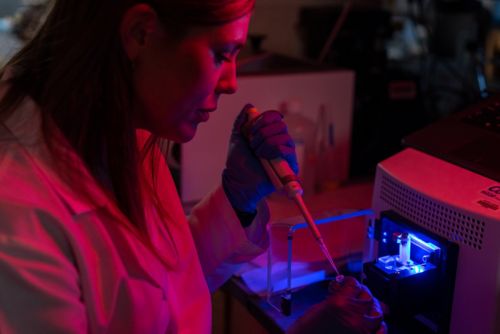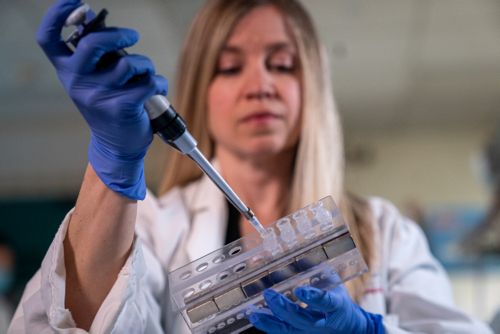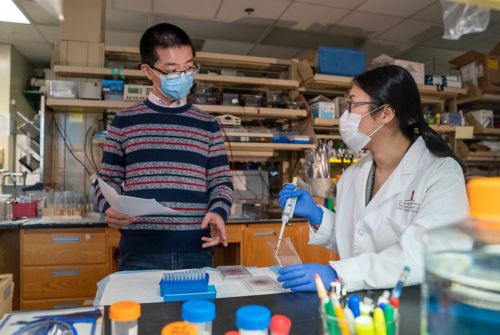St. Jude Family of Websites
Explore our cutting edge research, world-class patient care, career opportunities and more.
St. Jude Children's Research Hospital Home

- Fundraising
St. Jude Family of Websites
Explore our cutting edge research, world-class patient care, career opportunities and more.
St. Jude Children's Research Hospital Home

- Fundraising
Li Lab
Deciphering three-dimensional chromatin architecture and transcription regulation in cancer
About the Li Lab
Noncoding regions of the human cancer genome are largely unexplored. We are committed to using integrative approaches to decipher the function of noncoding segments involved in cellular processes. Our work is both hypothesis-driven and exploratory. We hope to better understand how gene regulation is precisely controlled in cancers. This will help provide insight into alternative therapy development.

Our research summary
Using cutting-edge technologies and multidisciplinary approaches – including genetic and epigenomic CRISPR editing, comprehensive screens, and the auxin-induced protein degradation system – we investigate the precise function of the noncoding segments involved in gene transcription, chromatin architecture, and chromatin accessibility maintenance.
We are focused on the intriguing phenomenon of how a DNA strand two meters long can be packed into a single nucleus. This requires condensed packaging on a chromatin architecture-based foundation. However, in such a complicated three-dimensional environment, DNA still needs to be dynamically accessible for normal transcription to occur. Regulation of this packaging needs to be spatially and temporally controlled, and any mutations or perturbations that affect the chromatin environment can lead to diseases including cancer.

Our laboratory explores how the complicated, three-dimensional chromatin architecture is maintained in the normal cell and cancer. One element of our research is focused on a protein called CTCF, which is critical to maintaining chromatin architecture. We derived an experimental model of acute CTCF depletion using an auxin-inducible system leveraging E3 ubiquitin ligase mediated degradation. With this model, we can conduct time course experiments and study the function of CTCF in transcription and avoid the survival crisis caused by conventional deletion models. Following controlled CTCF depletion, we revealed the direct role of CTCF in regulating transcription, chromatin accessibility and chromatin architecture. This approach can be applied to different tumor types to identify possible novel points of transcription regulation.
We are also interested in a particularly aggressive form of cancer, MLL-rearranged leukemia, which is characterized by high expression of HOXA9. Previously, it was thought that CTCF regulated HOXA9 expression, but we’ve discovered that in fact, CTCF does not play a role in modulating this gene locus. This finding was based on studies using our auxin-inducible degradation system. We subsequently generated a fluorescent reporter system, with a tag integrated after the HOXA9 locus, and conducted a series of CRISPR screens that revealed the integrity of the DNA locus structure is critical to normal regulation. We can use this reporter system with any gene of interest in leukemia models to comprehensively screen for the full regulome of a particular target.
Our laboratory has developed many tools and platforms to advance our research, including CHASE-knock in, a reporter-based saturation noncoding CRISPR screen, and focused CRISPR libraries against transcription factors and post-transcriptional modifiers. We have also established epigenomic characterization techniques, including ATAC-seq, CUT&RUN, STARR-seq, Capture-C, and CRISPR-interference. We collaborative across the institution in our commitment to discovery and resource advancement.

Contact us
Chunliang Li, PhD
Tumor Cell Biology MS350
St. Jude Children's Research Hospital
Follow Us

Memphis, TN, 38105-3678 USA GET DIRECTIONS